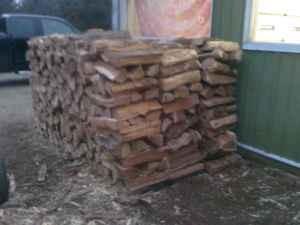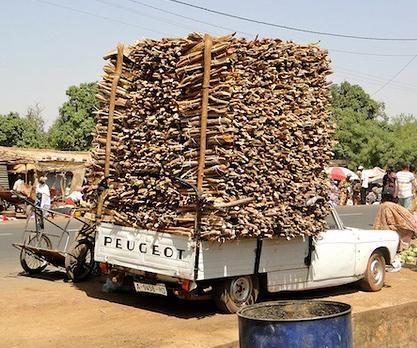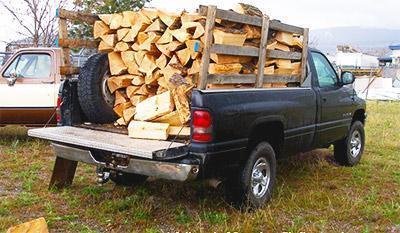A Cord of Firewood
We found this video and it makes the pointWhen buying firewood, customers often ask about what the size terms mean. We mostly sell partial cords of wood since it is kiln-dried and ready to burn, and storage space is often at a premium. This fits with our urban and suburban marketplace. Because there are no bugs in the wood and it is clean and dry, they can store it inside. With periodic burning and not wanting to take up too much space, our service fits well. This way, customers can buy less than a full cord and have it delivered. The confusion comes in when talking about amounts of firewood using terms other than a cord since there are so many terms used and people do not want to get the wrong amount or be short.
Anyway, the point is sometimes explaining all the terms of buying firewood and its quantity. So we want to explain each term so that we are talking apples to apples on the amount of wood you want to get and also not be misled by looking at a pile dumped at the side of the road and not knowing how much is being provided.
Terms Used to Buy Firewood
Multiple terms are used when talking about the measure and amount of firewood. Because of multiple terms used and conversations with customers, we find confusion in discussing units of measure in buying firewood. Firewood is sold by volume. Many terms are used to describe how much wood the buyer can expect to receive. The buyer should have a frame of reference to fit the terms of what they will buy to the amount of firewood they expect to need.
Customers who periodically buy firewood for their fireplace for burning often know what they want and have previously burned. The place it can get difficult when a person changes suppliers from a company that sells a truckload of wood to other companies that sell by the cord or a fraction of a cord. Standard terms often are not used.
The National Institute of Standards and Technology, on page 115, defines “fireplace and Stove Wood” in an all-inclusive way as follows: “Any kindling, logs, boards, timbers, or other wood, natural or processed, split or not split, advertised, offered for sale, or sold for use as fuel.” There are no quality descriptions for this; broken wood pallets would fit the definition. So this is a starting point. We feel it is important to supply a consistently high-quality kiln-dried firewood product and a fair measure. This agency is part of the U.S. Department of Commerce, and here is their firewood information.
They define a cord of wood as “The amount of wood that is contained in a space of 128 ft3 when the wood is ranked and well stowed.” Later on, they say that it can also be sold as fractions of a cord. In the firewood industry, there are several different terms for smaller quantities of firewood. With the smaller quantities, the different terms can be highly variable and sometimes be confusing on purpose. So do not be confused and ask questions. Doing this will give you a good idea of what is happening and ensure you get a fair shake in your firewood purchase.
A Full Cord of Wood
 Full Cord of Kiln-Dried Firewood
Full Cord of Kiln-Dried Firewood
A full cord of wood is 128 cubic feet of compactly stacked wood. The dimensions are 4 feet high, 4 feet deep, and 8 feet wide. Most firewood is cut to 16” lengths to fit well in most fireplaces. The other convenient part of this 16” length is it is conveniently divisible into the 4-foot depth dimension by 3. So, three stacks of 16-inch-long pieces of wood are stacked end to end to make up the 48” deep stack of wood.
A half cord of wood is 64 cubic feet. The stack of wood is half as wide. Here, the stack of wood based on 16” pieces would be 4’ high and 4’ deep, but the stacked width changes to 4’ wide.
A face cord is one-third of a cord. So, the volume of the stack would be a third of the 128 cubic feet of cord, which equals 42.66 cubic feet. The stacked dimension would be changed to one row deep instead of three. The stack would be 4 feet high by 8 feet wide and then 16” deep. The way it is stacked really has no basis it just needs to be an easy dimension and fit the area you have. So naturally, the same result would be if the wood was stacked two layers deep; a face cord could be 4’ high by 32” deep by 4 feet wide.
A quarter cord of wood is 4'x6'x16”. There is one row of wood in the stack for this amount, and the width is reduced to produce a volume of 32 Cubic Feet. Instead of 8 feet wide on the face cord, the quarter cord is 6 feet wide.
Half a face cord The next size down is again not as wide as the quarter cord the width is adjusted to 4 feet wide. This dimension changes to 4'x4'x16”, which provides 21.3 Cubic Feet of firewood. Talking about half a face cord, you must remember this is one row of wood, not half of a whole cord.
Quarter Face Cord With this term, you are getting a small quantity of wood for occasional burning. One row of 16” pieces of wood is typically stacked 4 feet wide by two feet high and 16” deep. Certainly, if you are unfamiliar with the benefits of burning kiln-dried firewood and want to see it for yourself, this is a great sample size.
Other terms people use to buy an amount of firewood
Buying firewood based on terminology that is not quantifiable opens the buyer up to variability in the amount of wood they actually get. For peace of mind, you just want to know you are treated fairly. Some of the variation in these terms is based on a company’s equipment used for loading and delivering firewood, and some of it is the mentality of the seller, who may or may not be trying to confuse the customer.
Firewood dealers often talk about the following terms. That truckload of wood certainly is not New England hardwood. With that size pile and that small a truck, it can not weight that much.
That truckload of wood certainly is not New England hardwood. With that size pile and that small a truck, it can not weight that much.
- Ricks
- Racks
- Rack
- Truckloads
- Stove cord
- Bush cords
- Pile
- pickup load
- A run of wood
- Apartment cord
- Fireplace Cord
- Furnace cord
- Short cord
- A tossed cord
- Green cords
Who wouldn't get confused and frustrated if you are calling to get firewood delivered and suddenly you can not understand what the person is really talking about and have no idea what sized truck will pull up outside? So here is some of the translation.
Ricks is an example of another term for a face cord of wood. So that would make it 4 feet high by 8 feet wide and then 16” deep.
A bush cord stack of wood that is 4’ 8’ by 16” deep, so this is the same as a face cord or a rick.
We think an apartment cord is a face cord, but please do not bet the ranch on that.
A furnace cord is also the same as a face cord, depending on who you are talking to!
A “run” of wood is also the same as a face cord in that it is one roof of wood 16” deep. All other dimensions stay the same, but not three rows deep. You would get a full cord. It is one run.
A rack of wood is a term often used by companies that restock a customer’s firewood rack for them. Here, the volume received is based on the dimensions of the rack being stocked and how much is left over from the previous order.
The term “Stove Cord” usually applies when a customer buys wood to burn in a stove. Since the stoves are often smaller than a fireplace, the size of each piece is shortened up to 12”. Less volume of wood makes burned also. Here is the dimensions of the stacked wood should be 4 feet high by 8 feet wide with an average length of 12 inches. It is like a face cord but smaller since the pieces are cut shorter.
A “tossed cord” would be wood that is loosely stacked in three rows, but the volume is increased from 190 cubic feet due to the recognition that there are a lot of voids when stacked.
A green cord refers to the firewood before being cut or split, and most wood will shrink by 9 to 7 cubic feet depending on the density of the wood and moisture content.
Terms with no specific definition we cannot find a dimension for
- Short cord
- Pile of Wood
- Fireplace cord
A Truck Load of Wood
 A pickup truckload of wood to be close to a cord of wood it has to have sides and a long bedA truckload of wood is just way too variable. It is sort of like saying I have a string in my pocket. How long is it, and how wet is it? Simply stated it all depends on the size of the truck body and how high the side boards are. A truckload could be as small as a face cord since the weight or body style may be too small to carry more. A truckload on a tractor-trailer, depending on the state you are traveling it can vary from 12 cords to 17 cords of wood. Again, this can vary by how dry the wood is. Sometimes, the space on the truck is OK, but weight regulations prevent more on the truck since the fine can be large and not worth the risk.
A pickup truckload of wood to be close to a cord of wood it has to have sides and a long bedA truckload of wood is just way too variable. It is sort of like saying I have a string in my pocket. How long is it, and how wet is it? Simply stated it all depends on the size of the truck body and how high the side boards are. A truckload could be as small as a face cord since the weight or body style may be too small to carry more. A truckload on a tractor-trailer, depending on the state you are traveling it can vary from 12 cords to 17 cords of wood. Again, this can vary by how dry the wood is. Sometimes, the space on the truck is OK, but weight regulations prevent more on the truck since the fine can be large and not worth the risk.
This variation in terminology or local practice is what people from different places tend to use. Different areas around Boston and New Hampshire can have some very different accents. Know what the term means or ask for clarification on what amount to expect. Then, check and verify.
We have customers who are not frequent buyers of firewood who get confused by some of the firewood measurement terms. We are concerned that they get what they want and know it. It is important to know the volume of the load, the species of the wood, and how dry it is. We take care of all this so you have a great wood-burning experience. It benefits us and the buyer to get a fair deal and consistent product.
Key Question!
Ask whoever you are buying from if you are confused about the following question. What are the dimensions of the wood pile I am going to get? Also, the moisture content of the wood, such as seasoned firewood vs. kiln-dried firewood. LISTEN carefully to the answer. This will tell you everything.